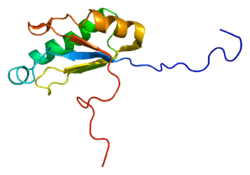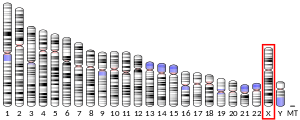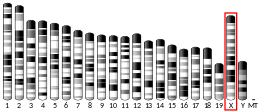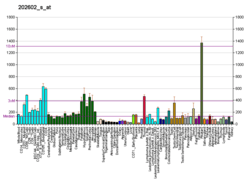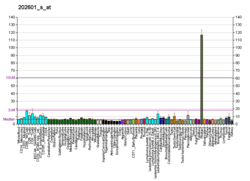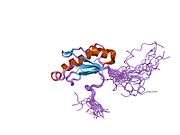HTATSF1
HIV Tat-specific factor 1 is a protein that in humans is encoded by the HTATSF1 gene.[5][6]
Whereas most DNA sequence-specific transcription factors increase the rate of initiation and interact with enhancer or promoter DNA, human immunodeficiency virus-1 (HIV-1) Tat predominantly stimulates elongation and interacts with the trans-acting responsive (TAR) RNA element. Tat is essential for HIV replication.[supplied by OMIM][6]
References
- GRCh38: Ensembl release 89: ENSG00000102241 - Ensembl, May 2017
- GRCm38: Ensembl release 89: ENSMUSG00000067873 - Ensembl, May 2017
- "Human PubMed Reference:". National Center for Biotechnology Information, U.S. National Library of Medicine.
- "Mouse PubMed Reference:". National Center for Biotechnology Information, U.S. National Library of Medicine.
- Zhou Q, Sharp PA (November 1996). "Tat-SF1: cofactor for stimulation of transcriptional elongation by HIV-1 Tat". Science. 274 (5287): 605–10. Bibcode:1996Sci...274..605Z. doi:10.1126/science.274.5287.605. PMID 8849451.
- "Entrez Gene: HTATSF1 HIV-1 Tat specific factor 1".
- Kim, J B; Yamaguchi Y; Wada T; Handa H; Sharp P A (September 1999). "Tat-SF1 protein associates with RAP30 and human SPT5 proteins". Mol. Cell. Biol. 19 (9): 5960–8. doi:10.1128/mcb.19.9.5960. ISSN 0270-7306. PMC 84462. PMID 10454543.
Further reading
- Maruyama K, Sugano S (1994). "Oligo-capping: a simple method to replace the cap structure of eukaryotic mRNAs with oligoribonucleotides". Gene. 138 (1–2): 171–4. doi:10.1016/0378-1119(94)90802-8. PMID 8125298.
- Suzuki Y, Yoshitomo-Nakagawa K, Maruyama K, et al. (1997). "Construction and characterization of a full length-enriched and a 5'-end-enriched cDNA library". Gene. 200 (1–2): 149–56. doi:10.1016/S0378-1119(97)00411-3. PMID 9373149.
- Zhou Q, Chen D, Pierstorff E, Luo K (1998). "Transcription elongation factor P-TEFb mediates Tat activation of HIV-1 transcription at multiple stages". EMBO J. 17 (13): 3681–91. doi:10.1093/emboj/17.13.3681. PMC 1170704. PMID 9649438.
- Yan D, Perriman R, Igel H, et al. (1998). "CUS2, a yeast homolog of human Tat-SF1, rescues function of misfolded U2 through an unusual RNA recognition motif". Mol. Cell. Biol. 18 (9): 5000–9. doi:10.1128/MCB.18.9.5000. PMC 109085. PMID 9710584.
- Li XY, Green MR (1998). "The HIV-1 Tat cellular coactivator Tat-SF1 is a general transcription elongation factor". Genes Dev. 12 (19): 2992–6. doi:10.1101/gad.12.19.2992. PMC 317190. PMID 9765201.
- Parada CA, Roeder RG (1999). "A novel RNA polymerase II-containing complex potentiates Tat-enhanced HIV-1 transcription". EMBO J. 18 (13): 3688–701. doi:10.1093/emboj/18.13.3688. PMC 1171446. PMID 10393184.
- Kim JB, Yamaguchi Y, Wada T, et al. (1999). "Tat-SF1 protein associates with RAP30 and human SPT5 proteins". Mol. Cell. Biol. 19 (9): 5960–8. doi:10.1128/mcb.19.9.5960. PMC 84462. PMID 10454543.
- Fong YW, Zhou Q (2000). "Relief of two built-In autoinhibitory mechanisms in P-TEFb is required for assembly of a multicomponent transcription elongation complex at the human immunodeficiency virus type 1 promoter". Mol. Cell. Biol. 20 (16): 5897–907. doi:10.1128/MCB.20.16.5897-5907.2000. PMC 86067. PMID 10913173.
- Suñé C, Goldstrohm AC, Peng J, et al. (2000). "An in vitro transcription system that recapitulates equine infectious anemia virus tat-mediated inhibition of human immunodeficiency virus type 1 Tat activity demonstrates a role for positive transcription elongation factor b and associated proteins in the mechanism of Tat activation". Virology. 274 (2): 356–66. doi:10.1006/viro.2000.0480. PMID 10964778.
- Simmons A, Aluvihare V, McMichael A (2001). "Nef triggers a transcriptional program in T cells imitating single-signal T cell activation and inducing HIV virulence mediators". Immunity. 14 (6): 763–77. doi:10.1016/S1074-7613(01)00158-3. PMID 11420046.
- Fong YW, Zhou Q (2002). "Stimulatory effect of splicing factors on transcriptional elongation". Nature. 414 (6866): 929–33. doi:10.1038/414929a. PMID 11780068.
- Strausberg RL, Feingold EA, Grouse LH, et al. (2003). "Generation and initial analysis of more than 15,000 full-length human and mouse cDNA sequences". Proc. Natl. Acad. Sci. U.S.A. 99 (26): 16899–903. Bibcode:2002PNAS...9916899M. doi:10.1073/pnas.242603899. PMC 139241. PMID 12477932.
- Zhou BY, He JJ (2004). "Proliferation inhibition of astrocytes, neurons, and non-glial cells by intracellularly expressed human immunodeficiency virus type 1 (HIV-1) Tat protein". Neurosci. Lett. 359 (3): 155–8. doi:10.1016/j.neulet.2004.02.012. PMID 15050687.
- Ballif BA, Villén J, Beausoleil SA, et al. (2005). "Phosphoproteomic analysis of the developing mouse brain". Mol. Cell. Proteomics. 3 (11): 1093–101. doi:10.1074/mcp.M400085-MCP200. PMID 15345747.
- Smith MJ, Kulkarni S, Pawson T (2004). "FF domains of CA150 bind transcription and splicing factors through multiple weak interactions". Mol. Cell. Biol. 24 (21): 9274–85. doi:10.1128/MCB.24.21.9274-9285.2004. PMC 522232. PMID 15485897.
- Gerhard DS, Wagner L, Feingold EA, et al. (2004). "The status, quality, and expansion of the NIH full-length cDNA project: the Mammalian Gene Collection (MGC)". Genome Res. 14 (10B): 2121–7. doi:10.1101/gr.2596504. PMC 528928. PMID 15489334.
- Zhou M, Deng L, Lacoste V, et al. (2004). "Coordination of transcription factor phosphorylation and histone methylation by the P-TEFb kinase during human immunodeficiency virus type 1 transcription". J. Virol. 78 (24): 13522–33. doi:10.1128/JVI.78.24.13522-13533.2004. PMC 533906. PMID 15564463.
- Ross MT, Grafham DV, Coffey AJ, et al. (2005). "The DNA sequence of the human X chromosome". Nature. 434 (7031): 325–37. Bibcode:2005Natur.434..325R. doi:10.1038/nature03440. PMC 2665286. PMID 15772651.
- Missé D, Gajardo J, Oblet C, et al. (2005). "Soluble HIV-1 gp120 enhances HIV-1 replication in non-dividing CD4+ T cells, mediated via cell signaling and Tat cofactor overexpression". AIDS. 19 (9): 897–905. doi:10.1097/01.aids.0000171403.07995.92. PMID 15905670.
This article is issued from Wikipedia. The text is licensed under Creative Commons - Attribution - Sharealike. Additional terms may apply for the media files.
